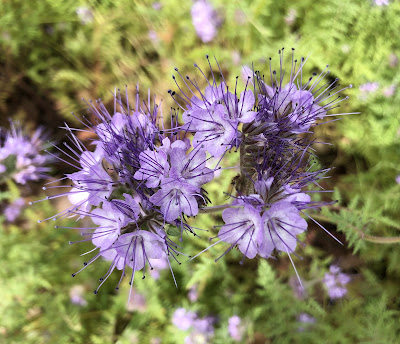
Soil Born Farms hosts hands-on workshop

|
|
Lacy phacelia (
Phacelia tanacetifolia
) is among the
California native plants that workshop attendees can
learn about at Soil Born Farms. (Photo: Kathy Morrison)
|
Want to go native? Get a quick course for success during a workshop hosted by Soil Born Farms.
Set for 10 a.m. to 12:30 p.m. Saturday, Jan. 22, this informative workshop will cover a lot of ground, including a tour of the Elderberry Farms Native Plant Demonstration Garden located at Soil Born Farms’ American River Ranch.
“Native plants are drought-tolerant, low-maintenance, beautiful and attract wildlife,” say the organizers. “Get a hands-on introduction to planting, growing and planning your garden with native plants. There’s nothing easier to grow than the natives, but it takes just a bit more observation and knowledge to get them to thrive.”
Native plant specialist Mark Shaffer, of Happy Grow Lucky Landscaping and the California Native Plant Society, will teach the basics as well as offer many tips for success. Elderberry Farms’ native plant nursery is also located at Soil Born Farms.
Advance registration is required. Course fee is $30.
Soil Born’s American River Ranch is located at 2140 Chase Drive, Rancho Cordova.
To register: https://soilborn.org/events/gardening-native-plants-1-22-22/
Details and directions: www.soilborn.org .
Comments
0 comments have been posted.Sacramento Digs Gardening to your inbox.
Food in My Back Yard Series
April 1: Don't be fooled by these garden myths
March 25: Fertilizer tips: How to 'feed' your vegetables for healthy growth
March 18: Time to give vegetable seedlings some more space
March 11: Ways to win the fight against weeds
March 4: Potatoes from the garden
Feb. 25: Plant a fruit tree now -- for later
Feb. 18: How to squeeze more food into less space
Feb. 11: When to plant? Consider staggering your transplants
Feb. 4: Starting in seed starting
Sites We Like
Garden Checklist for week of March 30
Your garden doesn’t mind April showers. Get busy now to enjoy those future flowers.
* Get ready to swing into action in the vegetable garden. As nights warm up over 50 degrees, start setting out tomato, pepper and eggplant transplants.
* From seed, plant beans, beets, cantaloupes, carrots, corn, cucumbers, melons, pumpkins, radishes and squash. (Soak beet seeds overnight in water for better germination,)
* Plant onion sets.
* In the flower garden, plant seeds for asters, cosmos, celosia, marigolds, salvia, sunflowers and zinnias.
* Transplant petunias, zinnias, geraniums and other summer bloomers.
* Plant perennials and dahlia tubers for summer bloom.
* Transplant lettuce and cabbage seedlings.
* April is the last chance to plant citrus trees such as dwarf orange, lemon and kumquat. These trees also look good in landscaping and provide fresh fruit in winter.
* Smell orange blossoms? Feed citrus trees with a low dose of balanced fertilizer (such as 10-10-10) during bloom to help set fruit. Keep an eye out for ants.
* Apply slow-release fertilizer to the lawn.